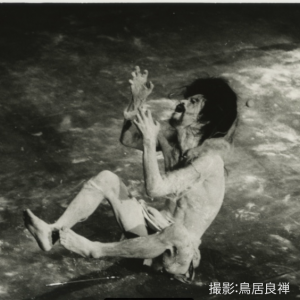Introduction to Archives XXII “A Story of Smallpox: Detached from the Life you were born with...”

This year marks the 50th anniversary of the public staging of one of Tatsumi Hijikata’s most pivotal butoh performances “A Story of Smallpox”
In 1972, Tatsumi Hijikata presented five works as part of his long run of performances “Twenty-seven Nights for Four Seasons” under the banner “Tohoku Kabuki.” This exhibition will feature a video recording of the first work in this run, “A Story of Smallpox,” alongside other valuable related materials. It will also showcase some outcomes of the Tatsumi Hijikata Archives’ activities. The exhibition will consider the butoh and underlying philosophy of Tatsumi Hijikata, who revolutionized the art form with “A Story of Smallpox,” a new milestone in the history of dance worldwide. We will also take the occasion of this anniversary to once again interrogate “the nature of butoh.”
Ryozen Torii
Courtesy of Keio University Art Center and Butoh Laboratory, Japan
Date
4 July - 29 July, 2022
11:00-18:00
Venue
Keio University Art Center (Keio University Art Space)
Audience
Open to Anyone
Cost
Admission Free
Enquiries and bookings
Keio University Art Center
03-5427-1621
pj.ca.oiek.tsda@ijnet-ca
Exhibition[Introduction to Archives]
Date
4 July - 29 July, 2022 11:00-18:00
Closed on Saturday, Sunday and Holiday
Venue
Keio University Art Space
[Located on the ground floor of Keio University South Annex]
2-15-45, Mita, Minato-ku, Tokyo, 108-8345
Tel. 03-5427-1621 Fax. 03-5427-1620
JR: Tamachi station on Yamanote - and KeihinTohoku Line
Subway: Mita station on Mita Line, Akabanebashi station on Oedo Line
Audience
Open to Anyone
Cost
Admission Free
Enquiries and bookings
Keio University Art Center
03-5427-1621
pj.ca.oiek.tsda@ijnet-ca
Organiser(s)
Organized by: Keio University Art Center
Supported by: Butoh Laboratory, Japan and Hijikata Tatsumi Asbestos-kan
1. Purpose of the Event
This year marks the 50th anniversary of the public performance of Tatsumi Hijikata’s masterpiece, “A Story of Smallpox.” With this work forming the starting point for the exhibition, the event will explore Tatsumi Hijikata’s other creative endeavors at that time.
What specific challenges did Tatsumi Hijikata task himself with this second manifesto of butoh as he sought to revolutionize and give life to an entirely new world of the art form? While the limited exhibition space and displays may not allow for a complete picture of the epochal 1972 performances held as part of “Twenty-seven Nights for Four Seasons,” we will nevertheless elucidate the essence of these performances as seen in Tatsumi Hijikata’s presentation of “A Story of Smallpox.”
By examining the turning points of the era, visitors can consider how to respond to Tatsumi Hijikata’s underlying question in 1972 of what form the “ideal butoh” might take. Fifty years on, we will retrace our steps from the age of COVID-19 to that of smallpox to once again ask, “what is butoh?”
2. Works to be exhibited (provisional)
・Video screening: Hijikata solo scene from “A Story of Smallpox” in “Sacrificing Great Paragone of Butoh: Performance to Commemorate the Second Unity of the Ankoku Butoh School (Hangi dai tou kan: dai-niji Ankoku Butoh ha kessoku kinen kouen) /Twenty-seven Nights for Four Seasons,” directed by Keiya Ouchida
・Hijikata’s Earthen Statue Project (Affirmation of Life Program: Hijikata’s Time of the Soil and Water Droplets & Commemorative video of installation in Tsuruoka)
・Thistle costume used in Gibasan (“Seaweed Granny”) from “Sacrificing Great Paragone of Butoh: Performance to Commemorate the Second Unity of the Ankoku Butoh School (Hangi dai tou kan: dai-niji Ankoku Butoh ha kessoku kinen kouen) /Twenty-seven Nights for Four Seasons”
*Actual exhibited items may differ. We ask for your understanding in this matter.